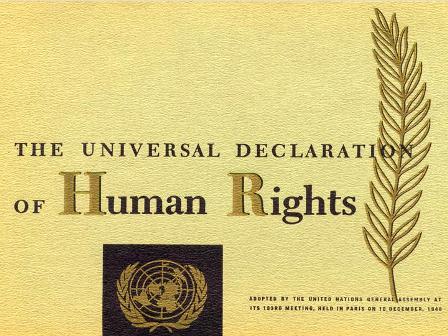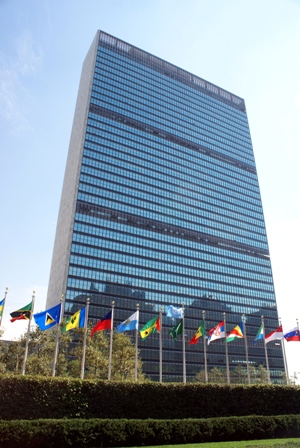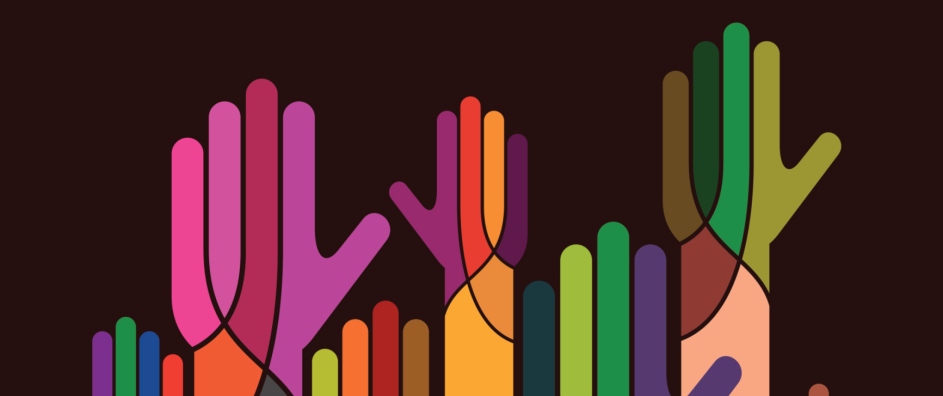The views expressed in our content reflect individual perspectives and do not represent the authoritative views of the Baha'i Faith.
If all of human history had happened today, the concept of human rights for all would’ve been born about two minutes ago.
Scholars have determined that no language on earth even contained a word or phrase for the concept of human rights before the year 1400. In 1789, the first nations to adopt formal definitions of human rights — the United States with its Bill of Rights and France with its Declaration of the Rights of Man and of the Citizen – limited those rights to white, property-owning males. The first truly egalitarian, global human rights document emerged from the United Nations in 1948 – The Universal Declaration of Human Rights. Now the basis for international law, the UDHR has become, in the 65 years of its existence, the most-translated document in the history of the world.
 But almost a century before the UN developed and promulgated the UDHR, the Baha’i Faith became the first religion to call for universal human rights. Baha’u’llah taught that every country must recognize the common global citizenship rights of all its peoples: “The earth is but one country, and mankind its citizens.” Abdu’l-Baha, speaking in Europe and North America in 1911 and 1912, reinforced the Baha’i concept of universal human rights:
But almost a century before the UN developed and promulgated the UDHR, the Baha’i Faith became the first religion to call for universal human rights. Baha’u’llah taught that every country must recognize the common global citizenship rights of all its peoples: “The earth is but one country, and mankind its citizens.” Abdu’l-Baha, speaking in Europe and North America in 1911 and 1912, reinforced the Baha’i concept of universal human rights:
Baha’u’llah taught that an equal standard of human rights must be recognized and adopted. In the estimation of God all men are equal; there is no distinction or preferment for any soul in the dominion of His justice and equity. – The Promulgation of Universal Peace, p. 181.
This early, radical advocacy raised a truly global Baha’i voice for guaranteed rights for all human beings. In his speeches, addresses and writings Abdu’l-Baha repeatedly pointed out the sheer absurdity of national, racial and gender-based prejudices, which granted rights to some but denied them to others:
…the world of humanity is one race, the surface of the earth one place of residence and these imaginary racial barriers and political boundaries are without right or foundation. Man is degraded in becoming the captive of his own illusions and suppositions. The earth is one earth, and the same atmosphere surrounds it. No difference or preference has been made by God for its human inhabitants; but man has laid the foundation of prejudice, hatred and discord with his fellowman by considering nationalities separate in importance and races different in rights and privileges. – The Promulgation of Universal Peace, p. 231.
Because of the strong Baha’i emphasis on human rights, the elected institutions of the Baha’i Faith have long made global human rights a high priority. The Baha’i International Community works closely with the United Nations to extend human rights protections to everyone, including the extremely poor, prisoners of conscience, women and children, the disabled and those who belong to national, ethnic, religious and linguistic minorities. In 2010 The Universal House of Justice, the democratically-elected governing body of the Baha’is of the world, issued this statement on gay rights:
With respect to your question concerning the position Baha’is are to take regarding homosexuality and civil rights… Baha’is are enjoined to eliminate from their lives all forms of prejudice and to manifest respect towards all. Therefore, to regard those with a homosexual orientation with prejudice or disdain would be against the spirit of the Faith. Furthermore, a Baha’i is exhorted to be “an upholder and defender of the victim of oppression”, and it would be entirely appropriate for a believer to come to the defense of those whose fundamental rights are being denied or violated.
The Baha’is themselves, especially those in Iran and Egypt, have suffered terrible oppression and the denial of their most fundamental human rights since the earliest days of the Faith’s existence. Because of the progressive Baha’i teachings on human rights-related issues and the essential unity of all religions, several governments have denied Baha’is their rights to education, employment, housing and even burial. Iran’s government has imprisoned, tortured and executed Baha’is solely for their Faith. Hundreds of Baha’is – including women, infants and the elderly – now languish in brutal Iranian prisons for no crime other than being Baha’is.
 Many of the world’s governments, including the United Nations, have repeatedly condemned these shameless violations of basic human rights, these crimes against humanity. Until the entire world adopts the Baha’i view on human rights for all, however, the oppression, persecution and denial of fundamental rights will continue – not just for the Baha’is, but for many oppressed peoples.
Many of the world’s governments, including the United Nations, have repeatedly condemned these shameless violations of basic human rights, these crimes against humanity. Until the entire world adopts the Baha’i view on human rights for all, however, the oppression, persecution and denial of fundamental rights will continue – not just for the Baha’is, but for many oppressed peoples.
Ultimately, the Baha’is believe that the arc of universal human rights will inevitably bend toward justice:
The wrong in the world continues to exist just because people talk only of their ideals, and do not strive to put them into practice. If actions took the place of words, the world’s misery would very soon be changed into comfort. My hope for you is that you will ever avoid tyranny and oppression; that you will work without ceasing till justice reigns in every land…. – Abdu’l-Baha, Paris Talks, p. 16.
You May Also Like
Comments

















The rest of this post is quite long, but is purposed to correct a technical error of the Scriptural basis for the ...current definition of Baha'i marriage, an error that is so often encountered in discussions with all people on this subject, whether gay or not or Baha'i or not, and so the reader may continue if so interested.
This truth is that the prohibition on pederasty and sodomy are NOT the reason why Baha'i marriage is...and I loathe to use such a commonly used (and never used in Baha'i Scripture) term...between one man and one woman. This is a marked difference between the Baha'i community and other religious communities. Most (if not all...as far as my research has gone) religious communities rely on prohibitions against sodomy, or vague references to the Book of Genesis where woman is created as the partner for man, as reasons for specifically saying that marriage is defined between a man and woman. Although that inference can certainly be made...it is only one of many (MANY) possible interpretations. Since gay people are not automatically, or any more than heterosexual people as far as I know, child molesters or those who enjoy anal sex (the latter based on surveys, and completely believable), this basis for denying same-sex marriage as part of religious doctrine is weak, in my opinion as a Baha'i and scientist. It seems more that religionists have an idea of religion they want, and are then going into scripture to support their claims, rather than building a concept of marriage holy based in scripture. The problem there being that most religious scripture barely talks about marriage in terms of clear laws and ordinances...some to the point that early believers viewed marriage and sex of any kind as a sin. This is in stark contrast to what many religious fundamentalists would have people believe. Scholarship in history can come in handy for these issues.
In the Baha'i teachings, however, for the first time, a Manifestation of God actually reconstructs marriage from the ground up, and prescribes it positively to His followers. Several paragraphs of The Most Holy Book (Kitab-i-Aqdas) are dedicated to the subject of marriage, as are many of Abdu'l-Baha's Writings. These make marriage a law, they indicate why it is a law, how we should go about following such a law, and what the restrictions are. Within the Aqdas, Baha'u'llah, clearly and without need for interpretation, states the 2 (at leas main - my addition) reasons for calling His followers to engage in wedlock:
Enter into wedlock, O people, that ye may bring forth one who will make mention of Me amid My servants. This is My bidding unto you; hold fast to it as an assistance to yourselves. (Baha'u'llah, Kitab-i-Aqdas p. 63)
In several translations it comes out the same and is not subject to interpretation...one of the two primary purposes for marriage is to have children, and the other to assist ourselves (although it doesn't state immediately in what way it is in assistance, but most of the other Writings on marriage seem to describe how it is quite clearly, and these are probably very familiar to Baha'is and others alike). To interpret anything other than that the main, but not only (because otherwise it would be a mechanistic use of the human body), purpose of marriage is to create children, is to in fact add our own desires and partisanship to our understanding...and thus make an interpretation. Much like other religious communities, to do so would mean we are only loosely basing our beliefs and policy on Scripture and only molding it to our desire. For Baha'is it is quite easy and 100% scripturally based...one of the purposes of marriage must be to have children. Whether this seems unfair because it might deny Baha'i acceptance of same-sex marriage or marriage of those heterosexual couples who cannot have children (which I'm not necessarily saying that it does), is really not the point. This issue has two facets: (1) whether Baha'u'llah defined marriage in a way as to make it impossible for same-sex marriages to be included in it, and (2) if this is a correct thing for Him to have done. The second point is not really of concern to those who believe in Baha'u'llah. If someone doesn't believe in the Baha'i teachings, they can simply not enrol as a Baha'i, and thus not be bound by its laws. But to be a Baha'i means to strive to obey His laws, or at the very least not to believe they are wrong. For a Baha'i to say that the reason same-sex marriage is not accepted is because of pederast and sodomy (and yes I understand the source for these in letters from Shoghi Effendi to an individual believer in response to their personal questions on several subjects) is to blatantly deny the clear command of Baha'u'llah as to why God has enjoined marriage for us, as I have referenced above with virtually no interpretation of my own, and to fabricate a fictitious scenario based on the history of other religions. The text is very clear in both the original language and in several interpretations, as far as I have read them.
If one requires further proof from an actual authorized interpreter of Baha'u'llah's Writings, Shoghi Effendi, in his own hand (authoritative) and in English (no translational issues) has said:
"The recrudescence of religious intolerance, of racial animosity, and of patriotic arrogance; the increasing evidences of selfishness, of suspicion, of fear and of fraud; the spread of terrorism, of lawlessness, of drunkenness and of crime; the unquenchable thirst for, and the feverish pursuit after, earthly vanities, riches and pleasures; the weakening of family solidarity; the laxity in parental control; the lapse into luxurious indulgence; the irresponsible attitude towards marriage and the consequent rising tide of divorce; the degeneracy of art and music, the infection of literature, and the corruption of the press; the extension of the influence and activities of those “prophets of decadence” who advocate companionate marriage, who preach the philosophy of nudism, who call modesty an intellectual fiction, who refuse to regard the procreation of children as the sacred and primary purpose of marriage, who denounce religion as an opiate of the people, who would, if given free rein, lead back the human race to barbarism, chaos, and ultimate extinction—these appear as the outstanding characteristics of a decadent society, a society that must either be reborn or perish." (Shoghi Effendi, WOB, http://www.bahai.org/r/880875264)
I have added spaces to highlight the main sentence (in regards to this issue) from the paragraph. So...the conversation could certainly continue in regards to the membership of same-sex couples as registered Baha'is, of how this law applies to infertile couples, etc. etc. etc. and that is simply up to the Universal House of Justice to decide, and is in human hands (although divinely guided as Baha'is believe). These decisions might also change over time and be subject to a changing society...I don't know. However, the definition of Baha'i marriage which restricts it to a heterosexual couple is clearly prescribed by Baha'u'llah Himself, and has not been "imposed" as some would assert, by Baha'i believers onto gay Baha'is. It also cannot be changed by Baha'is, as this would undermine the entire legitimacy of Baha'u'llah as a Manifestation of God. One only has to figure out if one believes in Baha'u'llah, and thus takes His path as being the "proper" path, or if one does not, in which case one is completely out of the sphere of Baha'i law...and beyond any attempt from Baha'is to impose any of their laws onto you. In fact I would argue, but not here in length, that LGBT individuals who are in favor of state legalization of same-sex marriage have allies in the entire Baha'i community (in regards to human rights and the freedom to choose ones own path, and not necessarily religious truth per se...as human rights is not based on final truth but is the starting foundation of all searches after truth, and is thus rooted in freedom).
I hope Baha'is and others will stop looking to other religious and political ideologies for explanations of why Baha'is believe what they believe, and instead go to the Writings of Baha'u'llah Himself, and if necessary go to His authorized interpreters, in that order.
As respectfully as I could make this as a scientist/engineer ;)
Shidan